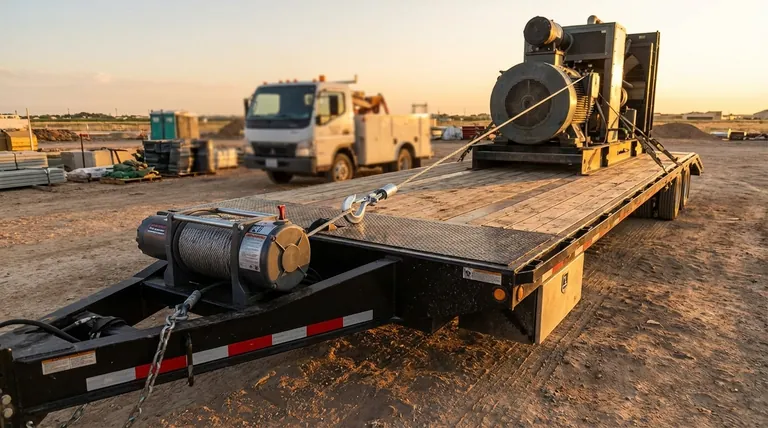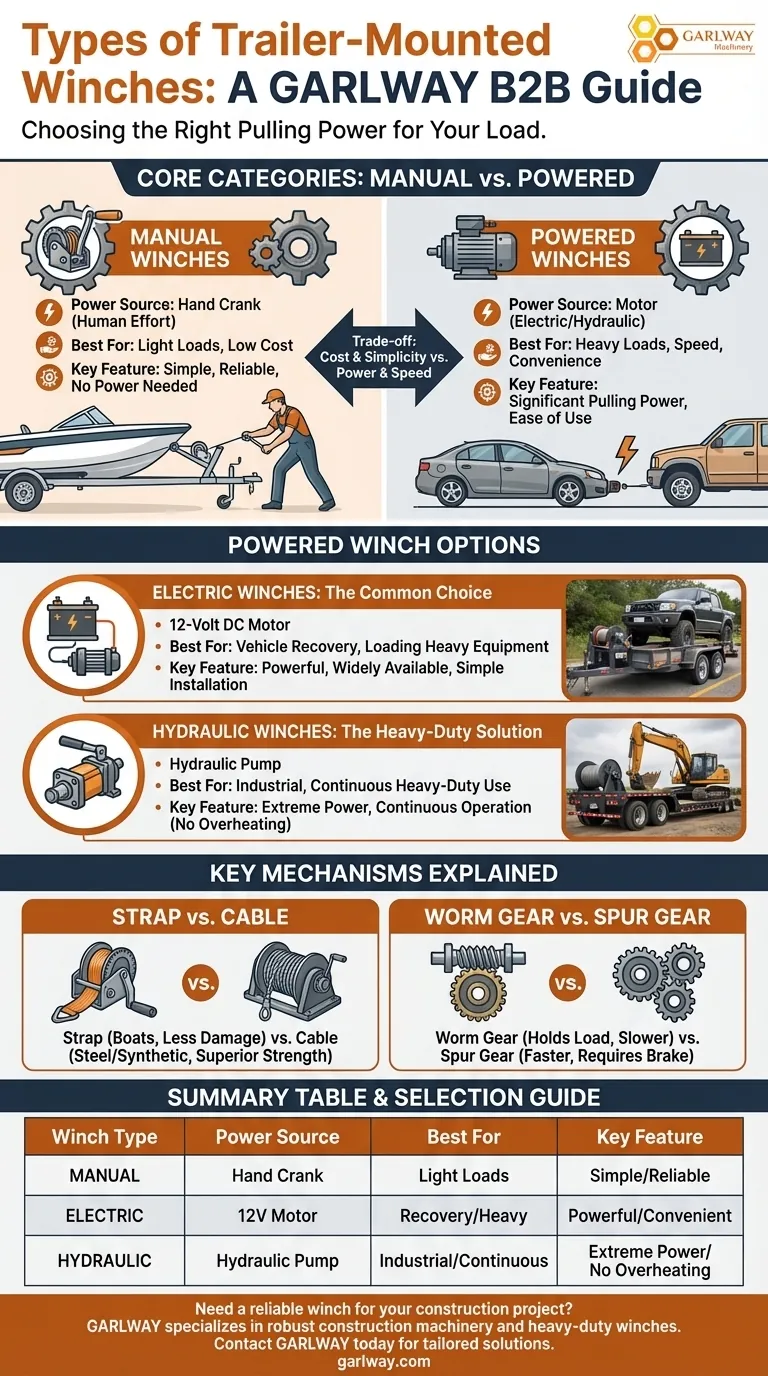The primary types of trailer-mounted winches are manual, electric, and hydraulic. Manual winches operate via a hand crank, offering simplicity and reliability. Electric winches, the most common type, use a 12-volt motor for power and convenience, while hydraulic winches are reserved for heavy-duty industrial applications requiring immense, continuous pulling force.
The choice between trailer winch types is a direct trade-off. You are balancing the upfront cost and simplicity of manual winches against the power, speed, and convenience offered by powered systems like electric and hydraulic winches.

The Core Categories: Manual vs. Powered
The most fundamental distinction in trailer winches is whether the pulling force comes from you or from a motor. This choice dictates the cost, complexity, and capability of your entire system.
Manual Winches: Simplicity and Reliability
Manual winches are the simplest form, relying on your physical effort to turn a hand crank connected to a set of gears. This gear ratio provides a mechanical advantage, allowing you to pull loads you couldn't move by hand.
They are an excellent choice for lighter loads where cost is a major factor. Because they have no motors or electrical components, they are highly reliable and require no connection to a power source.
Powered Winches: Speed and Strength
Powered winches use a motor to do the heavy lifting for you. They are essential for heavier loads like cars, large boats, or heavy equipment where manual cranking would be impractical or impossible.
While more expensive and complex than manual versions, their ease of use and significant pulling power make them the standard for most serious applications.
Exploring Powered Winch Options
Once you decide you need a powered winch, the next choice is the source of that power. The vast majority of users will find their solution in an electric winch.
Electric Winches: The Common Choice
Electric winches are the most popular and widely available type of powered winch. They use a small but powerful 12-volt DC motor that connects directly to your towing vehicle's battery.
Their balance of power, relatively simple installation, and broad availability makes them the go-to solution for everything from vehicle recovery to loading heavy equipment onto a trailer.
Hydraulic Winches: The Heavy-Duty Solution
Hydraulic winches are a specialized category for extreme, often commercial, applications. They are powered by a hydraulic pump, which is typically driven by the towing vehicle's power steering system.
Their key advantage is the ability to pull massive loads and run for long periods without overheating—a common limitation of electric winches. This makes them ideal for industrial uses but overly complex and expensive for typical consumer needs.
Understanding Key Winch Mechanisms
Beyond the power source, you may encounter terms that describe the winch's internal design or specialized function.
Strap vs. Cable
This refers to the line used for pulling. Straps are common on smaller, manual boat winches as they are less likely to damage the boat's finish. Steel or synthetic rope cable is used on higher-capacity electric and hydraulic winches for its superior strength.
Worm Gear vs. Spur Gear
This describes the internal gearing. Worm gear winches are excellent at holding a load in place and have a natural braking action, but they are slower. Spur gear winches are faster but require a separate mechanical brake to hold the load securely.
Twin Bull-Wheel & Capstan Winches: Industrial Specialists
These are not typically used for loading items onto a trailer. A twin bull-wheel winch, for example, is a heavy-duty machine used by utility companies to pull underground electrical or fiber-optic cable over long distances. They don't store the cable on a drum in the same way a recovery winch does.
Making the Right Choice for Your Goal
Selecting the right winch means matching its capabilities to your specific task.
- If your primary focus is loading a small boat, jet ski, or light utility items: A manual winch offers unbeatable value and reliability for a low cost.
- If your primary focus is vehicle recovery or loading heavy equipment: An electric winch provides the necessary power and ease of use that is essential for these tasks.
- If your primary focus is continuous, commercial-grade pulling: A hydraulic winch is the only option that delivers the required power and duty cycle for sustained industrial work.
Ultimately, understanding these core differences empowers you to select a winch that will perform safely and effectively for your intended purpose.
Summary Table:
| Winch Type | Power Source | Best For | Key Feature |
|---|---|---|---|
| Manual | Hand Crank | Light loads, low cost | Simple, reliable, no power needed |
| Electric | 12V Motor | Vehicle recovery, heavy equipment | Powerful, convenient, widely available |
| Hydraulic | Hydraulic Pump | Industrial, continuous heavy-duty use | Extreme power, no overheating |
Need a reliable winch for your construction project?
GARLWAY specializes in robust construction machinery, including heavy-duty winches designed for the demanding needs of construction companies and contractors. Whether you require a powerful electric winch for equipment loading or a hydraulic system for continuous industrial use, our solutions are built for performance and durability.
Contact GARLWAY today to discuss your specific requirements and get a quote tailored to your project.
Visual Guide

Related Products
- Ready Mixer Machine for Construction Ready Mix Machinery
- Commercial Construction Mixer Machine for Soil Cement Mixing Concrete
- Small Electric Winch 120V and 240V for Compact Applications
- Electric and Hydraulic Winch for Heavy Duty Applications
- 12000 lb Heavy Duty Electric Boat Winch
People Also Ask
- What is a trailer winch and how does it work? Essential Guide for Safe & Efficient Loading
- What is an electric winch and what are its uses? A Guide to Powerful Lifting & Pulling Solutions
- What are the advantages and disadvantages of wire rope electric hoists with the motor inside the drum? | Compact Design Trade-offs
- Where are electric winches commonly used? Essential for Heavy Lifting and Pulling Tasks
- What is the general sentiment about the importance of having a winch? Essential for Off-Road & Work Safety
- What should never be done when the winch is under load? Avoid Catastrophic Failure with This Critical Rule
- What are the potential consequences of reckless use of an electric winch? Avoid Catastrophic Failure & Injury
- What are some key winching techniques to follow? Master Safe Recovery for Your Fleet



















